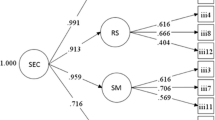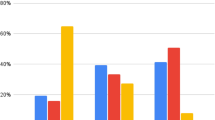Abstract
Positive judgments on the Self are good predictors of academic achievement. It could be useful to benefit from an instrument able to assess how pupils elaborate self-judgments. So far, such a tool does not exist. The purpose of the present study was to develop a self-report measure of social judgment for children at school (the School Social Judgment Scale—SSJS). 660 pupils completed a questionnaire addressing 12 socio-academic behaviors. An exploratory factor analysis highlighted a four-factor structure of social judgment (Assertiveness, Competence, Effort and Agreeability). A Confirmatory Factor Analysis (CFA) provided further support for this model, both in terms of factorial and construct validity. Reliability ranged from questionable to good depending on SSJS subscales. Multigroup CFA revealed invariance of the SSJS across gender and showed that boys had higher scores than girls for the assertiveness scale. Overall, the SSJS represents an efficient tool to better understand how social judgment for children works. As such, it could assist professionals of education to develop suitable educational support to assist poorly performing children at school.

Similar content being viewed by others
References
Abele, A. E., Cuddy, A. J., Judd, C. M., & Yzerbyt, V. Y. (2008). Fundamental dimension of social judgment. European Journal of Social Psychology, 38, 1063–1065.
Abele, A. E., & Wojciszke, B. (2007). Agency and communion from the perspective of self versus others. Journal of Personality and Social Psychology, 93, 751–753.
Abele, A. E., & Wojciszke, B. (2013). The big two in social judgment and behavior. Social Psychology, 44, 61–63.
Bakadorova, O., & Raufelder, D. (2015). Perception of teachers and peers during adolescence: Does school self-concept matter? Results of a qualitative study. Learning and Individual Differences, 43, 218–225.
Bentler, P. M., & Chou, C.-P. (1987). Practical issues in structural modeling. Sociological Methods & Research, 16, 78–117.
Blackwell, L. S., Trzesniewski, K. H., & Dweck, C. S. (2007). Implicit theories of intelligence predict achievement across an adolescent transition: A longitudinal study and intervention. Child Development, 78, 246–263.
Bong, M., & Skaalvik, E. M. (2003). Academic self-concept and self-efficacy: How different are they really? Educational Psychology Review, 15, 1–40.
Brown, T. A. (2006). Confirmatory factor analysis for applied research. New York: The Guilford Press.
Byrne, B. M. (2012). Structural equation modeling with Mplus. New York: Psychology Press.
Carrier, A., Louvet, E., Chauvin, B., & Rohmer, O. (2014). The primacy of agency over competence in status perception. Social Psychology, 45, 347–356.
Cheung, G. W., & Rensvold, R. B. (2002). Evaluating goodness-of-fit indexes for testing measurement invariance. Structural Equation Modeling, 9, 233–255.
Cislak, A. (2013). Effects of power and social perception. All your boss can see is agency. Social Psychology, 44, 138–146.
Cohen-Laloum, J., Mollaret, P., & Darnon, C. (2017). Distinguishing the desire to learn from the desire to perform: The social value of achievement goals. The Journal of Social Psychology, 157, 30–46.
Corbières, M., Fraccaroli, F. F., Mbekou, V., & Perron, J. (2006). Academic self-concept and academic interest measurement: A multi-sample European study. European Journal of Psychology of Education, 21, 3–15.
Cvencek, D., Fryberg, S.A., Covarrubias, R., & Meltzoff, A.N. (2017). Self-concepts, self-esteem, and academic achievement of minority and majority North American elementary school children. Child Development. https://doi.org/10.1111/cdev.12802.
D’Amico, A., & Cardaci, M. (2003). Relations among self-efficacy, self-esteem, and school achievement. Psychological Reports, 92, 745–754.
Dompnier, B., & Pansu, P. (2010). Social value of causal explanations in educational settings: Pupils’ self-presentation and teachers’ representations [La valeur sociale des explications causales en contexte éducatif : auto-présentation des élèves et représentations des enseignants]. Swiss Journal of Psychology, 69, 37–49.
Dompnier, B., Darnon, C., & Butera, F. (2009). Faking the desire to learn: A clarification of the link between mastery goals and academic achievement. Psychological Science, 20, 939–943.
Dompnier, B., Pansu, P., & Bressoux, P. (2007). Social utility, social desirability and scholastic judgments: Toward a personological model of academic evaluation. European Journal of Psychology of Education, 3, 333–350.
Dweck, C. S. (1986). Motivational processes affecting learning. American Psychologist, 41, 1040–1048.
Dweck, C. S. (1999). Self-theories: Their role in motivation, personality, and development. Philadelphia: Psychology Press.
Fiske, S. (2015). Intergroup biases: A focus on stereotype content. Current Opinion in Behavioral Sciences, 3, 45–50.
Fiske, S. T., Cuddy, A. J., Glick, P., & Xu, J. (2002). A model of (often mixed) stereotype content: Competence and warmth respectively follow from perceived status and competition. Journal of Personality and Social Psychology, 82, 878–902.
Frost, J., & Ottem, M. (2016). The value of assessing pupils’ academic self-concept. Scandinavian Journal of Educational Research. https://doi.org/10.1080/00313831.2016.1212397.
Halim, M. L., Zosuls, K. M., Ruble, D. N., Tamis-LeMonda, C. S., Baeg, A. S., Walsh, A. S., et al. (2016). Children’s dynamic gender identities across development and the influence of cognition, context, and culture. In C. S. Tamis-LeMonda & L. Balter (Eds.), Child psychology: A handbook of contemporary issues (3rd ed., pp. 193–218). New York: Psychology Press/Taylor & Francis.
Hascoët, M., Pansu, P., Bouffard, T., & Leroy, N. (2017). The harmful aspect of teacher conditional support on student’s self-perception of school competence. European Journal of Psychology of Education. https://doi.org/10.1007/s10212-017-0350-0.
Heyder, A., & Kessels, U. (2013). Is school feminine? Implicit gender stereotyping of school as a predictor of academic achievement. Sex Roles, 69, 605–617.
Hogan, R. (1982). A socioanalytic theory of personality. In M. M. Page (Ed.), 1982 Nebraska symposium on motivation: Personality-current theory and research (pp. 55–89). Lincoln: University of Nebraska Press.
Hu, L., & Bentler, P. M. (1999). Cutoff criteria for fit indexes in covariance structure analysis: Conventional criteria versus new alternatives. Structural Equation Modeling, 6, 1–55.
Mollaret, P., & Miraucourt, D. (2016). Is job performance independent from career success? A conceptual distinction between competence and agency. Scandinavian Journal of Psychology, 57, 607–617.
Muthén, L. K., & Muthén, B. O. (1998–2012). Mplus user’s guide (7th ed.). Los Angeles, CA: Muthén & Muthén.
Nunnally, J. C., & Bernstein, I. H. (1994). Psychometric theory (3rd ed.). New York: McGraw Hill.
Oldmeadow, J., & Fiske, S. T. (2007). System justifying ideologies moderate status = competence stereotypes: Roles for belief in a just world and social dominance orientation. European Journal of Social Psychology, 37, 1135–1148.
Ommundsen, Y., Haugen, R., & Lund, T. (2005). Academic Self-concept, implicit theories of ability, and self-regulation strategies. Scandinavian Journal of Educational Research, 49, 461–474.
Pajares, F., & Schunk, D. H. (2001). Self-beliefs and school success: Self-efficacy, self-concept, and school achievement. In R. Riding & S. Rayner (Eds.), Self-perception (pp. 239–266). London: Ablex Publishing.
Pansu, P., & Dubois, N. (2013). The social origin of personality traits: An evaluative function. In E. F. Morris & M. A. Jackson (Eds.), Psychology of personnality (pp. 1–23). New York: Nova Science Publishers.
Paulhus, D. L., & Trapnell, P. D. (2008). Self-presentation on personality scales: An agency-communion framework. In O. P. John, R. W. Robins, & L. A. Pervin (Eds.), Handbook of personality (pp. 493–517). New York: The Guilford Press.
Perrin, S., & Testé, B. (2010). Impact of the locus of causality and internal control on the social utility of causal explanations. Swiss Journal of Psychology, 69, 171–177.
Piche, C., & Plante, C. (1991). Perceived masculinity, feminity and androgyny among primary school boys: Relationships with the adaptation level of these students and the attitudes of the teachers towards them. European Journal of Psychology of Education, 6, 423–435.
Qureshi, A., Wall, H., Humphries, J., & Balani, A. B. (2016). Can personality traits modulate student engagement with learning and their attitude to employability? Learning and Individual Differences, 51, 349–358.
Raines-Eudy, R. (2000). Using structural equation modeling to test for differential reliability and validity: An empirical demonstration. Structural Equation Modeling, 7, 124–141.
Rohmer, O., & Louvet, E. (2013). Social utility and academic success of students with or without disability: The impact of competence and effort [Utilité sociale et réussite universitaire d’étudiants ayant ou non des incapacités motrices : rôles respectifs de la compétence et de l’effort]. Journal of Human Development, Disability, and Social Change, 21, 65–76.
Sass, D. A. (2011). Testing measurement invariance and comparing latent factor means within a Confirmatory Factor Analysis framework. Journal of Psychoeducational Assessment, 29, 347–363.
Scholtens, S., Rydell, A. M., & Wallentin, F. Y. (2013). ADHD symptoms, academic achievement, self-perception of academic competence and future orientation: A longitudinal study. Scandinavian Journal of Psychology, 3, 205–212.
Schwinger, M., Steinmayr, R., & Spinath, B. (2009). How do motivational regulation strategies affect achievement: Mediated by effort management and moderated by intelligence. Learning and Individual Differences, 19, 621–627.
Smeding, A., Dompnier, B., Meier, E., & Darnon, C. (2015). The motivation to learn as a self-presentation tool among Swiss high school students: The moderating role of mastery goals’ perceived social value on learning. Learning and Individual Differences, 43, 204–2010.
Soriano-Ferrer, M., & Morte-Soriano, M. (2017). Teacher perceptions of reading motivation in children with developmental dyslexia and average readers. Procedia-Social and Behavioral Sciences, 237, 50–56.
Spinath, B., Eckert, C., & Steinmayr, R. (2014). Gender differences in school success: What are the roles of students’ intelligence, personality and motivation? Educational Research, 56, 230–243.
Velicer, W., Peacock, A., & Jackson, D. (1982). A comparison of component and factor patterns: A Monte Carlo approach. Multivariate Behavioral Research, 17, 371–388.
Verniers, C., Martinot, D., & Dompnier, B. (2016). The feminization of school hypothesis called into question among junior and high school students. British Journal of Educational Psychology, 86, 369–381.
Wouters, S., Germeijs, V., Colpin, H., & Verschueren, K. (2011). Academic self-concept in high school: Predictors and effects on adjustment in higher education. Scandinavian Journal of Psychology, 52, 586–594.
Yang, Y., & Green, S. B. (2011). Coefficient alpha: A reliability coefficient for the 21st century? Journal of Psychoeducational Assessment, 29, 377–392.
Yuan, K. H., & Bentler, P. M. (2000). Three likelihood-based methods for mean and covariance structure analysis with nonnormal missing data. In M. E. Sobel & M. P. Becker (Eds.), Sociological Methodology 2000 (pp. 165–200). Washington, DC: American Sociological Association.
Yzerbyt, V. (2016). Intergroup stereotyping. Current Opinion in Psychology, 11, 90–95.
Ziegler, M., & Bensch, D. (2013). Lost in translation: Thoughts regarding the translation of existing psychological measures into other languages. European Journal of Psychological Assessment, 29, 81–83.
Author information
Authors and Affiliations
Corresponding author
Ethics declarations
Conflict of interest
The authors declared that they have no conflict of interest.
Appendix
Appendix
1.1 The School Social Judgment Scale (SSJS) for children
1.1.1 Instructions and items
On the following pages, you will find a series of phrases about you. Please read each phrase and decide how much you agree or disagree with that phrase. Then indicate your response using the following scale:
1 = strongly disagree
2 = disagree
3 = agree
4 = strongly agree
Feel free to answer without cheating. Nobody will know about it.
-
1.
In games, you always decide the rules
-
2.
You do your schoolwork to the best of your ability
-
3.
You like making your friends happy
-
4.
The exercises that you have to do in class seem easy to you
-
5.
You are usually the leader when you play with others
-
6.
You understand quickly what you are asked to do in class
-
7.
Whenever you have candy, you give some to your friends
-
8.
You are often the leader of a group
-
9.
You do everything you can to be a good pupil
-
10.
You understand faster than other pupils in your class
-
11.
You like doing favors to make people happy
-
12.
You are working hard even though it is difficult
Rights and permissions
About this article
Cite this article
Chauvin, B., Demont, E. & Rohmer, O. Development and validation of the School Social Judgment Scale for children: Their judgment of the self to foster achievement at school. Soc Psychol Educ 21, 585–602 (2018). https://doi.org/10.1007/s11218-018-9430-5
Received:
Accepted:
Published:
Issue Date:
DOI: https://doi.org/10.1007/s11218-018-9430-5




